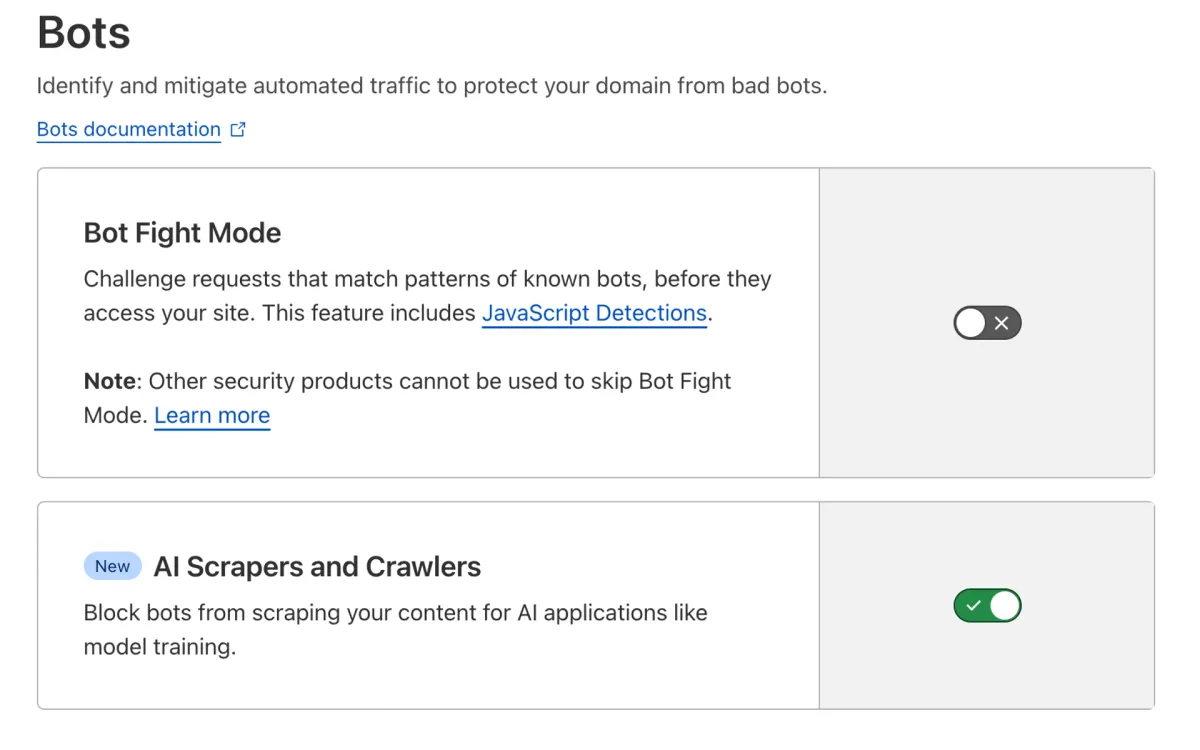
Cloudflare, a web security giant, has unveiled a new tool to combat unauthorized content scraping by AI bots. This feature empowers publishers to protect their valuable content from being used to train large language models (LLMs) without permission.
In today's digital age, content is king. Publishers invest significant time and resources in creating high-quality content for their audiences. However, the rise of AI has introduced a new challenge: AI crawlers, or bots, can scrape website content and use it to train LLMs, which are computer programs that mimic human language. This raises concerns about copyright infringement and the potential for AI-generated content to compete with original work.
Cloudflare's "Block AI bots" feature tackles this challenge head-on. By enabling this feature through the Cloudflare dashboard, publishers can create a custom rule that identifies and blocks AI bots from accessing their website content. This empowers publishers to:
- Protect Intellectual Property: Safeguard their unique content from being used to train LLMs without authorization.
- Maintain Content Exclusivity: Ensure their content remains exclusive to their platform, potentially increasing reader loyalty.
- Monetize Content More Effectively: By controlling access to their content, publishers can explore new monetization avenues.
This update goes beyond simply blocking AI bots. Cloudflare also offers "Verified Bot categories," allowing publishers to make informed decisions. They can choose to block specific AI crawlers while permitting others that operate with transparency and respect website guidelines. This granular control empowers publishers to:
- Identify Good Actors: Distinguish between responsible AI crawlers and those with malicious intent.
- Allow Beneficial Crawlers: Permit access to AI crawlers that contribute to website visibility or SEO.
- Tailor Access Levels: Define different access levels for various categories of AI crawlers.
While Cloudflare's solution equips publishers with powerful tools, the company acknowledges the need for industry-wide collaboration. They advocate for a standardized protocol specifically designed for handling AI crawlers. This would further empower publishers by providing a consistent framework for managing AI content access across the web.
Publishers Take Control
New features from Cloudflare empower website owners to block AI content scrapers, but the underlying issue of copyright and LLM training data is a complex one. While this offers publishers more control, legal and ethical questions remain.
The limitations of simple solutions like robots.txt
While modifying robots.txt files allows publishers to request exclusion from scraping by specific AI companies (currently Google and OpenAI), it's not a foolproof solution. It doesn't guarantee compliance from other companies and doesn't address the broader issue of copyright and fair use in the age of AI.
Microsoft AI CEO Mustafa Suleyman's argument that most web content is essentially freeware for AI training unless explicitly restricted challenges the concept of copyright. This perspective raises concerns for publishers who invest significant resources in creating unique content.
The Perplexity investigation
Adding fuel to the fire is the recent investigation into Perplexity, an AI search startup. Perplexity is accused of scraping content from websites that explicitly blocked access through robots.txt, highlighting the potential for misuse of scraping practices in LLM training.
This issue goes beyond just protecting content. Unethical scraping practices can lead to biased training data for LLMs, potentially impacting the accuracy and fairness of these AI models. As AI continues to evolve, collaboration between policymakers, AI developers, and content creators is crucial to establish a framework that fosters innovation while respecting intellectual property rights.

